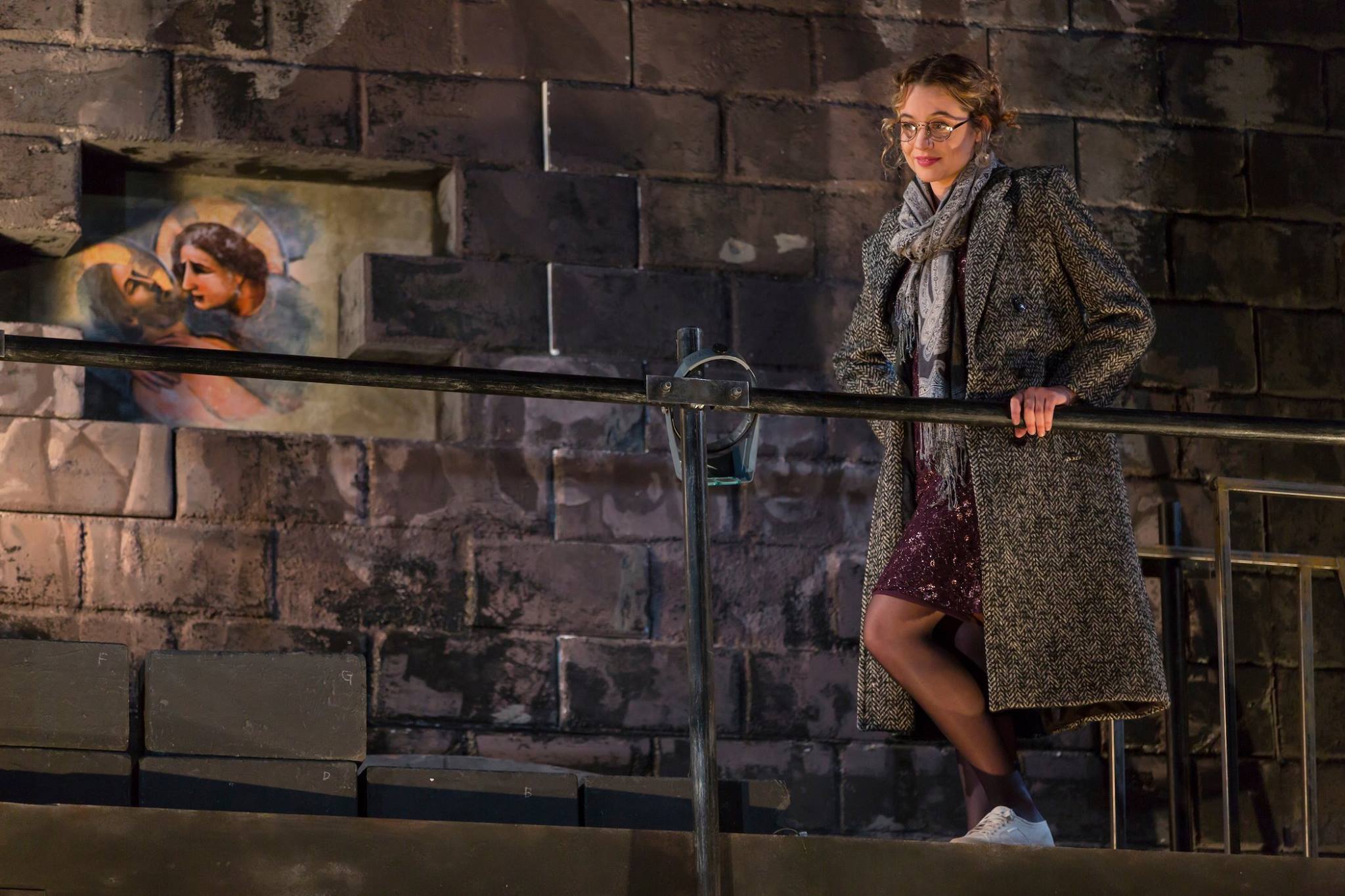Review of This Sweet Affliction, Yale Cabaret
What is a “sweet affliction?” In an old Baptist hymn that uses the phrase, it can be likened to the “happy fall” or felix culpa, the sin—often, “original sin”—that brings the sinner to Jesus. In another sense, being corporal is itself an “affliction” made “sweet” by faith. In the play This Sweet Affliction by Blake Hackler, the phrase is an ironic reference to a strange condition suffered by a group of high school girls, a condition that becomes a figure for how they vie for popularity and success.
The play adapts its action from an outbreak of symptoms akin to Tourette’s syndrome that plagued several teenage girls in a small school in a small town in Le Roy, New York, in 2012. Hackler’s play, at the Yale Cabaret, directed by Francesca Fernandez McKenzie, takes some of the events, moves them to a small town in Texas, and places at the heart of the drama a teenage girl named Anna (Stephanie Machado), a devious manipulator who begins all the fuss when her application as an acting student to North Carolina School of the Arts is rejected. The affliction she mimes establishes her on a fast track to fame and TV appearances and possibly other media deals. Sweeeet. Soon, others are similarly afflicted.
Anna (Stephanie Machado)
The Cabaret production, with spirited ensemble work by the entire cast, manages to have fun with several bugaboos: the cliquishness of high school girls and the alpha importance of one or two over the others; Heathers-ish tropes like disowning a former friend due to one’s own rise in popularity; popular movements, or, perhaps, collective hysteria; the rigors of “facebook friending”; YouTube viral celebrity; small-town dreams and delusions; the fictive demands made by “reality TV”; to say nothing of those always ready targets—cheerleaders, blondes, and Texans (or, hot damn, all three in one!). Hackler gets in a few other winks—like the fact that Anna is rehearsing a starring role in a school production of The Devils, about demonic possession among nuns in medieval France, when the first fit hits her, and that they might put on The Crucible next. In addition to Anna, the play offers a few plum comic roles that are indulged here to the hilt.
Debbie (Rachel Kenney), Megan (Courtney Jamison), Bailey (Marie Botha)
One such is Marié Botha as the school’s resident drama teacher, full of pretension and an undimmable sense of the glory of having once taught Clare “My So-Called Life” Danes. Her voice in Anna’s head urges the girl to up the ante for more attention. Botha also plays Bailey, the traitor in their midst, who believes Anna is faking her affliction. Then there’s Courtney Jamison as Megan, the Drill-Sargent as cheerleading-squad leader; in addition to Megan’s maniacal grip on her underlings, Jamison wields comic accents with reckless abandon. As Debbie, Rachel Kenney gets to play the most put-upon of the cheerleading girls and doubles memorably as Anna’s mother, a single, working mom whose idea of bliss is a few pies from “the Hut” and who seems to see having a teenaged daughter as affliction enough. Stella Baker is underused as a flamboyant dance instructor and a doctor or two, and as Keira, a gossip. Last but not least, there’s Patricia Fa’asua as Morgan, endearing Tai to Anna’s lordly Cher, à la Clueless, who, like Tai, gets to deliver a comeuppance. Fa’asua makes the most of playing a girl who is comical, likeable, talented, and way sharper than the popular girls give her credit for being. She has a way of dropping verbal bombs with self-effacing aplomb.
Finally, there’s Anna. Machado gives her enough dark intensity to keep us on her side even when she’s clearly leading everyone up the garden path. Her peers, but for Morgan, are vacuous and vain and, as perhaps the vainest of all, Anna hits on a means to become a unique sort of celebrity. Her “seizures” are compelling in a rehearsed, choreographed way, a bit like a punk performance.
Anna opens the show making a streaming video with gullible Morgan that will up the ante to fatal proportions, then takes us on a retrospective trip down the rabbit-hole of her particular growing pains. By the close, she has moved from actor in her own melodrama to the director of a fantasized coup de théâtre. Machado handles it all with the kind of eerie, inexorable will that we'd expect to find in any self-involved sociopath. It would be chilling if it weren’t so funny.
Sarah Nietfeld’s scenic design gives us a central stage with corner spots in the audience for the ensemble girls to inhabit and look on from, enhancing the audience’s sense of being onlookers and in their midst at once. In her directorial debut at the Cab, third-year actor McKenzie keeps the action focused and lets each actor make the most of what amounts to a bevy of cameos. The chemistry is sweet indeed.
This Sweet Affliction
By Blake Hackler
Directed by Francesca Fernandez McKenzie
Producer: Caitlin Volz; Dramaturg: Rory Pelsue; Scenic Designer: Sarah Nietfeld; Costume Designer: Herin Kaputkin; Lighting Designer: Emma Deane; Sound Designer: Ruoxi (Roxy) Jia; Composer: Liam Bellman-Sharpe; Video Designer: Johnny Moreno; Choreography: Ensemble-devised; Stage Manager: Sarah Thompson; Technical Director: Kelly Pursley; Assistant Director: Taiga Christie; Assistant Technical Director: Becca Terpenning
Cast: Stella Baker, Marié Botha, Patricia Fa’asua, Courtney Jamison, Rachel Kenney, Stephanie Machado
Yale Cabaret
November 9-11, 2017









